Important note: Images and videos posted on this
website are very graphic. Viewers discretion is strongly advised!
Al-Qaim I
Al Qaim Hospital:
Tragedy beyond DescriptionSabah
Ali, Brussells Tribunal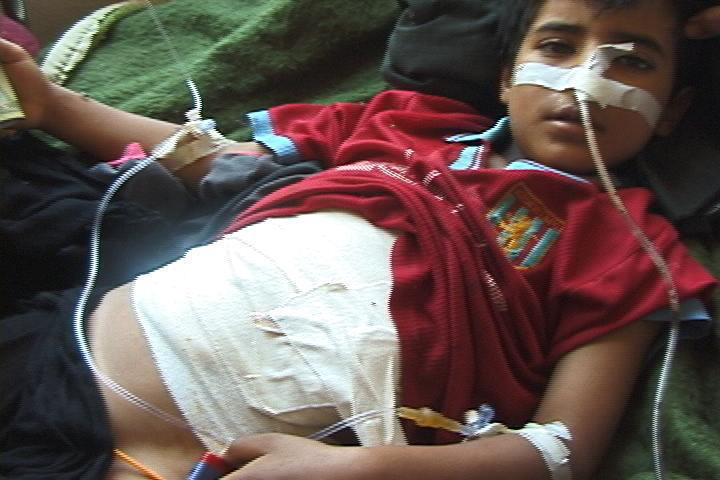
June 10 2005 The picturesque and peaceful landscapes on the way to Al-Qaim contradict sharply with the tragic
reality this little town more than 400 kilometers to the west of Baghdad, lives in for more than two years. The Euphrates
flows slowly and calmly among many villages and small townships, those we rarely hear of in the news: Karabla, Ebeidy, Rommana,
Al-Ish…surrounded by fruit orchards. Bombed houses on the way say something…but the reality is "beyond description"
as Dr. Hamdi Al-Aaloossy says. Dr. Hamdi was not in Al-Qaim when we arrived, but he came all the way from another city
to meet us. He was very angry. 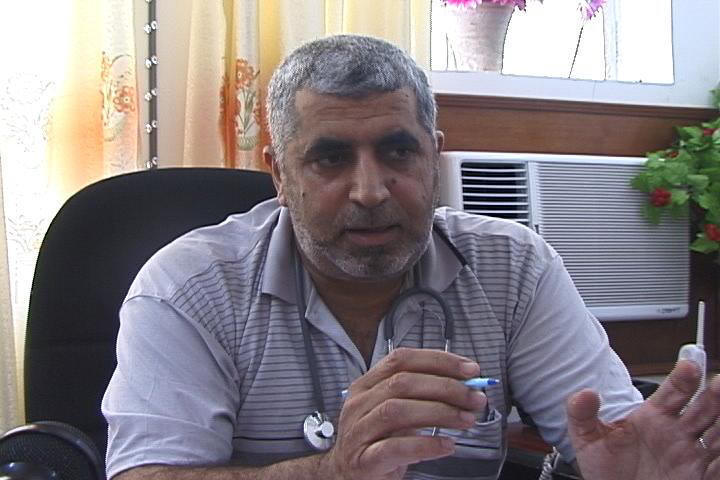 "What are you going to do for us? Once after I did an interview, the American troops came here and held me for more than 4
hours in my office. They did not leave until I show them the medical records and documents to support what I said in that
interview" What did they want?
"They asked me why I said that the casualties were
women and children while the American military spokesman said they were terrorists. I told them that the casualties I treated
here were women and children and showed them the medical files." After we had a tour in the hospital, listening to
what the patients and employees had to say, we found out that his anger was the least we could expect. Dr. Hamdi had to work,
protect his medical staff, and help the hundreds of urgent cases in extremely difficult, almost impossible, situation without
any help. "The events began on May 2, 2005" Dr. Hamdi began his description of the situation, "there was fierce fighting,
the hospital became a battle field. After 3 days of fighting and shelling on the hospital we decided to go to an alternative
one in the center of town. We gave first aid, blood transfusions, nutritious solutions and medicines. We saved many lives
in very difficult circumstances. We were under huge pressure. The ambulances movement was very limited, we could not do many
operations, but we managed to save many children. There were many casualties, the majority civilians, tens of dead bodies,
tens of the wounded. The situation was so tragic. We sent many calls of help to humanitarian organizations and to the fighting
parties too, to stop the blood bath. Thanks to God that the situation stopped at this point. We ask God peace and security
for this town". "But other towns were exposed to heavy bombing, in Karabla and Rommana, many were killed. We could
not reach them until after the fighting was over. I advice you to go there and see the damage, the demolished houses, and
the victims who were buried under the rubbles. There were tens of them. In one house 4 were killed and 7 wounded, this is
one example. The bombing and shells do not differentiate between civilians and fighters; they do not know children, old people,
and women. The horror was so great. Many families fled to the desert, with nothing, only the sand and the sky. It was a human
tragedy; we ask God that it will not happen again" What about the number of casualties?
"42
people were killed, more than 50 injured. I assure you that the majority were civilians, women, children and old people. In
Rommana 6 people were killed in one house, 5 in another." What about the alternative hospital?It
is a diwan (big guest room or hall) in one house. The family volunteered to host us. It was not easy to work, but we
did our best, as we say in Arabic "the less harmful", we had two choices: either stay in and jeopardize the lives of the medical
staff, or leave the town. The fighting went on for almost two weeks. We could work in Al-Qaim only. We managed to send some
medical help to Karabla, but the roads to Rommana were closed, we could not help them, and we apologized to them through some
satellite channels. But we went to see them after the fighting was over. 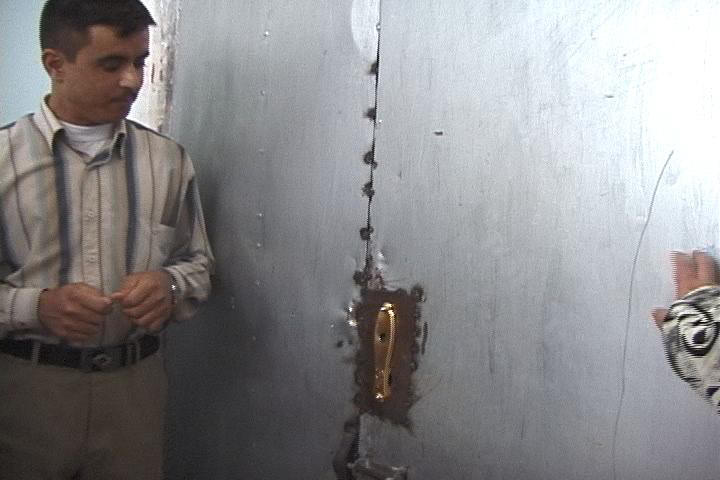 " Who helped them?
I can not say, but some of the wounded were moved to Mosul through
the desert. In Ebeidi they had an alternative hospital, and we sent them a surgeon and an anesthetist. It was tragic
because we could not move the injured to a hospital, we could not send an ambulance out, and we did not know how to behave. What about on normal days, not during military operations, are there any casualties?
certainly,
there are the American snipers. There are casualties every day. But of course when there are military operations the number
is much higher, the situation becomes indescribable. Not enough medical supplies, very limited ambulance movement, difficult
conditions…the second day in the alternative hospital, a bomb exploded few meters away. In normal situation there are
the land mines, the snipers, the clashes, there is no single day without firing, casualties, and families leaving town. In such (NORMAL) situation, do you have enough medical supplies especially for emergency cases?The
Red Crescent, the Humanitarian Relief and other organizations helped us, but the situation is too difficult, and we certainly
need more help… What are the damages in the hospital?
The hospital was partially
damaged, we lost 2 ambulances and one Land Cruiser, the air-conditions, electricity net, water, medical instruments,
doors, the building ….etc. We call upon humanitarian organizations for help. In the alternative hospital, we could do
different types of operations: blood, nutritious solutions, surgery, amputation, and lung paracentesis. We had to chose between
leaving the injured to death or do what ever we can do to save their lives. As doctors we can not go to our private clinics,
which are closed now. We attend patients in houses and in the streets… In the streets?!!!
Yes,
we stop on the road to examine a patient. Snipers do not differentiate between people, also the shelling, the mortars and
the bombing. The casualties are so many. 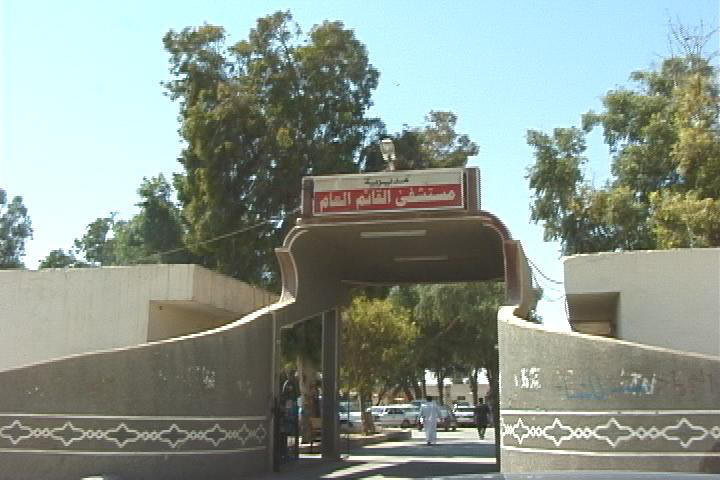 The whole atmosphere in Al-Qaim was tense. The sign that said "Welcome in Al-Qaim" at the main entrance of the town disappeared.
The main commercial street was mysteriously deserted; many houses and public buildings were destroyed to the ground. In
the hospital, a crowd of men were waiting, one of them was crying. Traces of shelling, bullets, blasts were obvious on the
walls, the broken windows, the ambulances and the air-conditions. In the emergency ward, a young man, Quosai, was lying, his
head and chest wrapped, respiratory tube on his nose, another tube coming out of his bleeding lung. Quosai has a shoes-shop
in the market. He was opening his shop when an American sniper shot him in the head and chest. How
is he now?
-unstable, Dr. Lam'an, who volunteered to show us around replied. "His right lung is torn, and
we do not know about his head injury yet, he has to be sent to Baghdad for further examination, we do not have the equipments
hear. Yesterday we sent another injured man; he passed away on the way to Baghdad". A man volunteered to talk: "This
is happening every day. Women and children are killed everyday. A 9 year old boy was injured with Quosai, and another man
in a jewelry shop. The same place, the same street, every day. The snipers are everywhere, they occupy the high buildings,
and they shoot randomly. 5 women were killed in a month, one of them is very old, she was going to the bank to receive her
pension, the car was shot and 4 people were killed in the spot, including her". The man who was crying outside turned
out to be Quosai's brother. He was crying bitterly, and could not hide his anger "we are innocent civilians going to work.
The American snipers are hiding everywhere aiming at who ever they want. We can not do anything, and this has been going on
for months, snipers, airplanes, mortars, bombing. God will avenge us against them." All the people of Al-Qaim say that
the customs building, which gives on the main commercial street, and which is occupied by the American troops and used as
their headquarters, is the point where the snipers are shooting people from. Facing Quosai was a 10 year old boy, Ahmad
Abdullah. His nose, hands, abdomen were all connected to many tubes. His abdomen was wrapped. Ahmad was going home from school
after receiving his final report, he had good marks, and was very happy to be in the forth grade, when a mortar shell torn
his stomach, liver and pancreas. He had shrapnel in his head. "What actually happened was that a mortar shell was dropped,
Ahmad was afraid, and he came running into the house when the second shell was dropped and injured him. There were no armed
fighter around, no terrorists, the American were shooting randomly and continuously", his father explained. 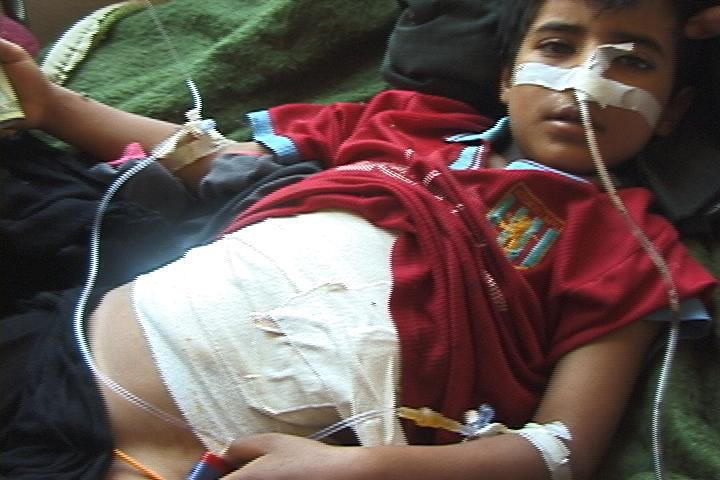 In the children ward, two women were preparing the kids who suffers from diarrhea, to leave, holding with them the medicines
and the solution bottles, Where are you going?We are leaving; it is not safe to stay in the hospital.
They began to talk about the problems we hear from almost all the Iraqi mothers nowadays: the milk is expensive, the fathers
are unemployed, life is difficult…etc. The ward itself was miserable, with the old equipments, ruined and bare beds.
The women ward was not better, neither the labor and delivery rooms. Dr. Lam'an explains that there is a new delivery hall,
but it is closed "we do not have a cadre, no assistant doctors, no nurses, no anesthetists…they are not willing to work
here. Few months ago a woman doctor and her fiancée, who is also a doctor, were killed, the anesthetist was beaten badly by
the American troops. He refused to come back to work for a month". The only operation theater in hospital was not in
a better shape. The windows were closed by bricks because every time the glasses were repaired, a blast destroys them. The
doors are destroyed by soldiers' kicks or blasts. "All kinds of operations are done here" explained Dr.Lam'an, "Al-Qaim is
a town of 200.000 population. You can imagine the pressure, with all the wounded and the women cases. We added a new operation
table now, but the place is miserable as you can see". The walls were cracked; the operation table was broken and supported
by a piece of wood. "This is our electronic door" Dr. Lam'an was sarcastically pointing at an aluminum door which has been
broken and repaired many times. "Nothing is left unbroken here" says Abu Mohammad, a male nurse and assistant administrative
employee "the doors, the equipments, the windows, the cars…they say that we treat terrorists here, but when a patient
is brought we do not ask if he is a terrorist or a soldier. I' ve been working here for 30 years, nothing like this happened
under Saddam, with all his injustice. No doctor was ever beaten or humiliated. No doctor was arrested. We got rid of Saddam,
but all the woe began. If you see the autopsy files, all of them are women and children. 50% of Al-Qaim people run away, in
my area only three families are left, the houses are deserted, the shops are closed. They (the American) destroyed the court
building, the fuel station, a house for the unmarried, the insurance company. The snipers are every where, occupying the houses
and buildings. They say we want to protect you from the terrorists…but we do not know when the American would come and
demolish our houses".  Abu Mohammad showed us all the destruction of the hospital. Aysha, a young widow covered with black, who works in the
hospital, was there on May 2, 2005. "It was noon; the shooting began after a dead body was brought here. The hospital
was surrounded; the place was full of armed men. I told them that my 3 children are alone in the house and that I got to leave.
I had to go from corner to corner, under the fire. I found the fighters inside my house. They told me to stay, I could not.
I decided to take the children to my father in law's house across the street. A shell was dropped at the door; I decided to
go no matter what. My husband's family went out to see, another shell was dropped on them, 5 children were killed, and 4 women
injured, one of them lost one of her eyes. I left Al-Qaim and went to Ebeidi; the fighting was heavier, so I went to a village
called Al-Khaseem until the fighting was over. Many people are telling me to leave Al-Qaim, but where am I to go, I work here".
Aysha's father, an old man in his 80s, was killed by a sniper shot while he was leaving the mosque. Her husband died 4 months
ago in a car accident. Her oldest son is 6 years. :: Article nr. 12462 sent on 11-jun-2005 14:26 ECT
:: The address of this page is : www.uruknet.info?p=12462
:: The incoming address of this article is :
www.brusselstribunal.org/ArticlesIraq.htm#AlQaim
Al-Qaim II
Snipers' Indiscriminate Killings: Testimonies of Civilian Casualties(Dedicated to the UN, with Documents)
Sabah Ali, Brussells Tribunal
While we were writing this report , Dr .H Al-Aaloossy , the director of Al-Qaim General Hospital sent a call
for help (June 20,2005) to the international community asking for lifting the military siege imposed by the American and British
troops on Al-Qaim and the neighboring areas, and to let the ambulances evacuate the wounded. He also called upon these troops
to stop the blood bath, and to let water, electricity, and medical help reach the civilians. He said that tens of families
are buried under the rubbles and no medical help can reach them. He confirmed that the majority of the casualties were civilians,
women and children.
The stories we heard in Al-Qaim General Hospital (see part I) give part of the picture. Al-Qaim
is becoming a town of death. Before the current attack, the American snipers were the major problem. Almost all the casualties
we heard of, or saw were shot by snipers who occupy houses after arresting the whole family in one room, or simply evacuate
it.
But the main and the most dangerous place is the customs building. Al-Qaim is a border town, and the customs building
looks on the main street. It is occupied by the American troops who shot civilians in that street where the market place and
the clinics compound are. Many shop owners, civilians, women and children were killed by these snipers' bullets.
Shokor Mahmood
Shokor was the only son of a poor widow, and a brother of two young
sisters. He has just turned 20 and was newly married. His wife Sarah, 16, is one month pregnant. He was a worker in a shoes
shop for $50 a month. His father was killed in the Iraqi-Iranian war in the eighties. He had to leave school at the fifth
grade to help his mother supporting the family. The family actually lived on charities and small businesses, selling candies,
cleaning…etc.
On May 21, 2005, at 5 in the afternoon he went to the market. He was shot by snipers in his chest
and died immediately; the shot was in the heart.
Subhi, Shokor's uncle and father in law explains what happened: "at 5.45 six bullets were shot from the customs
building, five people were injured and Shokor was killed. He was walking, eating nuts with his friends, not armed."
- Who shot them?
- The American. They occupied the whole area: the court, the Bank, the fuel station,
the shops…every thing. Any one walks on that way is shot
- Why?
- This is the question: why? He is not
a mojahid, not a fundamentalist, his mother prevents him, he is her only son, she is crazy about his safety. But this happens
daily, to every one not only Shokor, just now a young man is shot, he is in the hospital (Referring to Qusai we mentioned
in part I), we want to know why the American are killing people who do not threaten them. They (the American) are controlling
and surrounding the whole area, so why killing civilians, and old women…The shop owners can not open, if they do, they
must not put their heads out …
- how long this has been going on?
- since they occupied the fuel station
less than two months ago. Since then they destroyed the agriculture building, the bank, the court, and the shops near the
court. It seems that they were attacked from a place behind the station. They exploded the building
- the buildings
were not air bombed?
- No, they were exploded from inside. Our problem is that there is no media to cover these
crimes. If you cross the river, go to Rabot village, you can see the three families which were killed yesterday at 3 am. Where
is the media! One missile in Rabot village made a hole of 20 meters in the ground. Houses are flattened to the ground. Go
to Karabla village, and see the houses and the families who were bombed. If they are after terrorists, why they bomb houses.
This is our problem. They want to destroy us. If they are after Zarqawi, as they say, why do not they catch him? They are
one thousands every where, apart from the National Guards. Al-Qaim would not take five minutes to be surrounded and controlled.
Why they killed the Anbar governor!. They know that he was kidnapped and they know where he was kept near Rawa, why did they
bomb the area and kill him?"
Other Fallujah's
The military campaign on Al-Qaim is going on for
two months now. The people say that the American troops had a very bad hit, that they gave many casualties, that is why a
new wave of attacks was expected, which came true soon. (On June 17 the second attack began, the American news say that 9
big bombs were dropped on the town, that tens were killed on that day. On June 20 Dr.Hamdi , the director of Al-Qaim General
hospital, sent a message through media calling upon the American and British troops to stop the blood bath and he called upon
the international and humanitarian organizations to do what ever they can to help the civilians who are buried under the rubbles,
to let ambulances move, especially in Karabla village, 5 kilometers east of Al-Qaim. He confirmed again that the majority
of the dead and wounded were civilians). The campaign means that they besiege the town, bomb it, occupy many houses and buildings,
and kill any moving thing. Daham, a citizen from Al-Qaim said that "they occupied no less than 100 houses for 2-3 days each
and then retreat, and use the roofs to shot near by houses. They arrest people collectively. There are hundreds of them in
Al-Qaim. When they raid a house and find some gusts they arrest them. This is again another big problem, because this town
is actually a center of a very large area, people come from far villages to see doctors or finish business; they stay in their
relatives' houses. When many men meet in a house, it is raided and they are arrested for suspicion of being terrorists. After
the attack on the neighboring villages many families seek refuge in Al-Qaim, again they are suspected. In Shokor's house there
were 4 families".
It is a policy of intimidation and humiliation. The people are not safe in their houses, in the street,
in their cars, in the hospital…They do not argue about arresting or killing fighters, because it is the fighter's choice
to fight. The argument is only about the civilians. A girl of 11, Sahar Diyab, was injured and taken by the American, supposedly
to be treated. She was never found. Her family is looking for 3 months everywhere. In Rabot village, men of 3 families were
arrested, 12 or 13 of them.
Rabot is a village of about one thousands, now no more than few tens remain because of
the bombing and raids. It is located between the Euphrates and the mountains, the American say that the mojahideen hide in
it, also in Karabla.
Trying to document the destruction…
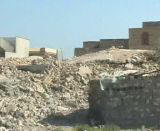 We tried to get some photos of the demolished public buildings, when a white car drove beside us We tried to get some photos of the demolished public buildings, when a white car drove beside us
- what are you doing?
a young man who was driving asked
- getting some shots of the street
- stop the car!!
- why?
-
just stop the car, I tell you….he was very serious. we stopped
- give me the camera
- no, why should I?
-
then you have to come with me, follow me!!
- no, we are not. Where do you want to take us? Who are you?
- just
follow me or give me the camera
- no!
- Does any one in Al-Qaim know you?
- of course, many
-
then take me to one of them.
We did, and after our friend form Al-Qaim confirmed to the young man that he knew us very
well, and that we were good, he apologized
- you have to understand that we lost too many people here, we can not tolerate
strangers taking pictures, and what were you doing there anyway?
- we wanted some pictures of the court and the bank
-
Do not. You were too near to the customs building, and do me a favor: leave Al-Qaim as soon as possible!!
……….
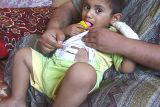 We could not. We had to meet a family whose mother was killed by snipers. She was visiting the private clinic of Dr. Ali Al-Ani
around 6pm on May 20, 2005, accompanied by her son, her daughter in law, and her grand son. The car was shot very heavily,
the mother, Wadha Jasim Hassan, 53, was killed the three others were injured. The car was burnt. We could not. We had to meet a family whose mother was killed by snipers. She was visiting the private clinic of Dr. Ali Al-Ani
around 6pm on May 20, 2005, accompanied by her son, her daughter in law, and her grand son. The car was shot very heavily,
the mother, Wadha Jasim Hassan, 53, was killed the three others were injured. The car was burnt.
Rain
of Ambers
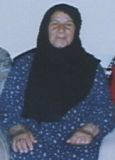 An eye witness of the crime described what happened "We were waiting for our turn in the clinic. Few minutes after the family
left, we heard the shooting. We tried to go out to see what was going on but the shooting was too heavy, like a rain of ambers.
I saw Abu Omar (the son) and his mother in the front seat. Waddhah, 2, was in the back seat, the daughter was still in the
clinic, she tried to go out, and she got a bullet in her head. Abu Omar was injured and he was bleeding .He opened the door
next to his mother and pushed her out, she was bleeding. He threw him self out of the car and was shouting at Waddhah. The
shooting continued on Abu Omar and the mother, both were on the ground outside the car. Dr Ali and two of us tried to reach
him, but it was impossible. Abu Omar crawled until he was about a meter from the clinic; we managed to pull him inside. His
mother was still lying beside the car, bleeding. The kid began to run towards us, he was shot and fell to the ground. The
car began to leak; we shouted at the mother to crawl, she tried. She actually crawled for few meters, but the shooting continued
on her until she was dead. The car began to burn ". An eye witness of the crime described what happened "We were waiting for our turn in the clinic. Few minutes after the family
left, we heard the shooting. We tried to go out to see what was going on but the shooting was too heavy, like a rain of ambers.
I saw Abu Omar (the son) and his mother in the front seat. Waddhah, 2, was in the back seat, the daughter was still in the
clinic, she tried to go out, and she got a bullet in her head. Abu Omar was injured and he was bleeding .He opened the door
next to his mother and pushed her out, she was bleeding. He threw him self out of the car and was shouting at Waddhah. The
shooting continued on Abu Omar and the mother, both were on the ground outside the car. Dr Ali and two of us tried to reach
him, but it was impossible. Abu Omar crawled until he was about a meter from the clinic; we managed to pull him inside. His
mother was still lying beside the car, bleeding. The kid began to run towards us, he was shot and fell to the ground. The
car began to leak; we shouted at the mother to crawl, she tried. She actually crawled for few meters, but the shooting continued
on her until she was dead. The car began to burn ".
- Was there fighting? Was it random shooting? Why the family car
was targeted?
- We do not know. There was nothing, no fighting; otherwise we could not go there. Another car, KIA Sportage,
was also shot and burnt. There were two children in, one 6 the other 14; he was injured too in the thigh.
The death
certificate of the mother says that the cause of death was a "piercing shot in the abdomen and the stomach. The spleen, the
small intestine, and the diaphragm were torn"
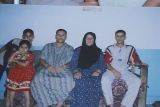 Abu Omar got two bad shots in his left shoulder and right thigh. He was still in the hospital in Baghdad. His wife had shrapnel
in her head, she needs a sensitive operation. The child lost two of his left hand fingers, and was injured in his intestine.
He had an operation and his condition is stable now. Abu Omar got two bad shots in his left shoulder and right thigh. He was still in the hospital in Baghdad. His wife had shrapnel
in her head, she needs a sensitive operation. The child lost two of his left hand fingers, and was injured in his intestine.
He had an operation and his condition is stable now.
Zarqawi had Dinner at Aftan's
During
our visits to the casualties, asking them why they were targeted, we heard the same joke: Zarqawi was there, and a reply came
quickly, "No, Zarqawi was having dinner with Aftan". We were very curios to know who this Aftan was until a young man volunteered
to show us the house. It was no more than a heap of rubbles.
Aftan was an old ill man. On May 26, 2005 at 2 am, his
house, which is located on the way to the customs building, was raided by huge forces with airplanes and armored vehicles.
Many troops invaded the house, arrested Aftan and his four sons, searched the house, and broke everything. After they left,
they blasted the house to the degree that not a single wall was still there. The 5 men are still in jail, the women are staying
with relatives.………
The problem is that after they finished with Aftan's house, they raided the next
neighbors asking what they knew about Aftan. Again they searched the house, found nothing interesting except a locked safe.
The owner of the house, who had the key, was sleeping in his second wife house in the same street. They did not wait for the
key and blasted the safe. They found nothing in it except 25.000 ID ($17) and the family personal documents. They took them
and arrested the only boy in the house, Hussein, who was diabetic. Two days later he was released.
"They asked me
what did I know about our neighbors, and I told them. I was beaten; I did not get my medicine, eyes and hands …
cuffed
no food, hot water, bad treatment…two days later I collapsed.
I was vomiting and fainted. They threw me on the
way to the paved road. They told me to run and began shooting at me. I ran as fast as I could until I fell near the car road.
A pick up took me some time later, I found myself in Rawa hospital".
"I wish he was killed fighting
them"
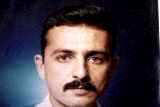 When Lo'ai, 30, finished his study in the engineering college and could not find job, he worked as a taxi driver on Al-Qaim-Baghdad
highway. On Nov 27, 2004, he was driving on the way between Falloja-Ramadi taking his mother in law to the cancer hospital
in Baghdad and two other passengers. The car was shot by the American troops, every body was killed and the car was set on
fire, as usual, to hide the evidence. When Lo'ai, 30, finished his study in the engineering college and could not find job, he worked as a taxi driver on Al-Qaim-Baghdad
highway. On Nov 27, 2004, he was driving on the way between Falloja-Ramadi taking his mother in law to the cancer hospital
in Baghdad and two other passengers. The car was shot by the American troops, every body was killed and the car was set on
fire, as usual, to hide the evidence.
Lo'ai was the only supporter of a very big family. Apart from his wife and three
children, the oldest of whom is 8, he was looking after 15 of brothers, sisters, mother and a handicapped father (a retired
employee in agriculture) and a mentally retarded brother.
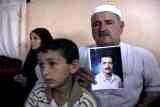 The father was crying bitterly "I know my son, he was very intelligent and committed. If the road was closed, he would have
known and stopped. They assassinated him" But the mother was proud "I consider him a martyr, he is my honor. I am only sorry
that he was not killed holding his gun fighting them" The father was crying bitterly "I know my son, he was very intelligent and committed. If the road was closed, he would have
known and stopped. They assassinated him" But the mother was proud "I consider him a martyr, he is my honor. I am only sorry
that he was not killed holding his gun fighting them"
They apologized and suggested help!
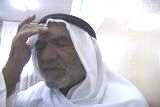 Bahjat … was taking his sons' bride, her mother and sister to a lunch invitation in Al-Qaim at 12 am on March 26, 2005.
There was an American check point. He stopped. Few minutes later the shooting began. The bride, whose wedding was few days
ago, who was sitting in the front seat beside her father in law, got a bullet in her head and died immediately. Bahjat, who
was driving got a bullet in his eye. After the attack an American officer came to the family, apologized for the (mistake)
and offered help treating the old man's eye. Bahjat … was taking his sons' bride, her mother and sister to a lunch invitation in Al-Qaim at 12 am on March 26, 2005.
There was an American check point. He stopped. Few minutes later the shooting began. The bride, whose wedding was few days
ago, who was sitting in the front seat beside her father in law, got a bullet in her head and died immediately. Bahjat, who
was driving got a bullet in his eye. After the attack an American officer came to the family, apologized for the (mistake)
and offered help treating the old man's eye.
Bahjat refused his offer and rejected his apology. He had already three
operations in his eye and was getting well.
Hippocritic Apology
 Salah Shaban Askar, a blind man in his fifties, and his son Omar, 14, were going back home from the mosque after evening prayer
on Sept 23, 2004 when they were shot in the head and chest 200 meters away from their house. There was no shooting, no fighting,
actually there was a crowd leaving the mosque. No one was allowed to approach them, according to a civil defence officer (A.J.)
who tried to attend and evacuate them. He was shot at. Salah Shaban Askar, a blind man in his fifties, and his son Omar, 14, were going back home from the mosque after evening prayer
on Sept 23, 2004 when they were shot in the head and chest 200 meters away from their house. There was no shooting, no fighting,
actually there was a crowd leaving the mosque. No one was allowed to approach them, according to a civil defence officer (A.J.)
who tried to attend and evacuate them. He was shot at.
The next two days, the American troops visited the family during
the funeral. They apologized for the (mistake) and told the family to present a claim and ask for compensation. They also
arrested some people who were attending the funeral. The family did present a file in two languages explaining everything
and asking for compensation, with all the police, the hospital, and witnesses testimonies and documents. They waited for months,
there was no reply. Then a friend brought them their file saying that he found it in the Civil Defense garbage.
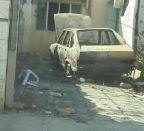 Salah who lost his eye in 1991 war, left 6 young daughters, one of them is Mongolian. The family is living on charities now,
the widow is trying to get her husband's pension but it is difficult to leave Al-Qaim because of the whole situation and because
the transportations are too costly" Salah who lost his eye in 1991 war, left 6 young daughters, one of them is Mongolian. The family is living on charities now,
the widow is trying to get her husband's pension but it is difficult to leave Al-Qaim because of the whole situation and because
the transportations are too costly"
"The problem is that there is no authority to go to and ask help" says Qahtan A.
Askar, Salah's nephew and son in law. "The court, the police station, the committee, even the mosque…all is destroyed".
In the mosque there is a relief fund. The family presented the file to get some help. The mosque was raided, destroyed, and
the fund was stolen.
Mustapha was lucky
 Mustapha, 12, lives in the railway station. On April28, 2005 he was going to see his friend when he got shot by an American
sniper. The shot tore his back and abdomen. But he was lucky; the shot was very close to his back bone but did not injure
it, neither his intestine nor stomach. He had an operation immediately and is getting well. Mustapha, 12, lives in the railway station. On April28, 2005 he was going to see his friend when he got shot by an American
sniper. The shot tore his back and abdomen. But he was lucky; the shot was very close to his back bone but did not injure
it, neither his intestine nor stomach. He had an operation immediately and is getting well.
Alaa' survived
by a miracle
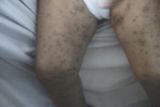 Not a single centimeter of Alaa' Khalid's body was free of shrapnel. She is 3 years old; her family did not believe that she
could survive. Alaa' is one of a family of 14. The men, two brothers, work as carpenters in Rawa (one hour to the east of
Al-Qaim). On May 3, 2005 they returned home to find everybody, the entire family, killed or injured. A grenade was dropped
on the house. There were 4 women and 10 children. Alaa's mother, Zeinab, lost her eye. Two other women's legs were broken.
5 of the children were killed and buried in that day. Not a single centimeter of Alaa' Khalid's body was free of shrapnel. She is 3 years old; her family did not believe that she
could survive. Alaa' is one of a family of 14. The men, two brothers, work as carpenters in Rawa (one hour to the east of
Al-Qaim). On May 3, 2005 they returned home to find everybody, the entire family, killed or injured. A grenade was dropped
on the house. There were 4 women and 10 children. Alaa's mother, Zeinab, lost her eye. Two other women's legs were broken.
5 of the children were killed and buried in that day.  Alaa' was thought to be dead too, she was no more than a paste flesh and blood, but she survived. She had shrapnel in her
eyes, and need an immediate operation that can not be done in Iraq. She had many holes in her intestine. Now she does not
look well, she is suffering the pains of too many shrapnel in her skin and different parts of her body. She can not eat properly,
and neither can she walk. Her legs are getting weaker. Alaa' was thought to be dead too, she was no more than a paste flesh and blood, but she survived. She had shrapnel in her
eyes, and need an immediate operation that can not be done in Iraq. She had many holes in her intestine. Now she does not
look well, she is suffering the pains of too many shrapnel in her skin and different parts of her body. She can not eat properly,
and neither can she walk. Her legs are getting weaker.
Suad is not getting any pension
 Suad Abbass Kadhum, 40, the widow of Hamid Abdul Majeed the train station employee who was killed in the market on Dec28,
2004. He left 5 children; the oldest of them is 16, an intermediate school student. Suad Abbass Kadhum, 40, the widow of Hamid Abdul Majeed the train station employee who was killed in the market on Dec28,
2004. He left 5 children; the oldest of them is 16, an intermediate school student.
Hamid had a herbs shop too. He
was inside his shop when shooting began in the market. Hamid was curios, he went out to see what was going on. He was shot.
He was not taken to the hospital until a long time later, when his friends in the market could move out. The medical death
certificate says that he died of bleeding in the neck, chest and abdomen.
Suad's problem now is how to get his pension,
because his salary is cut after his death. She is doing the only thing she could do, sewing. Her family and her husband's
family are not in a better financial condition. It is also too dangerous for her to move outside Al-Qaim to work on getting
a pension.
Dhafir: the wounded as Suspect
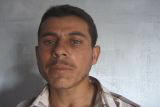 Dhafir, 25, student in the technical institute, was shot once by a sniper on August 20, 2004 in Si'da village. He was leaving
home in the evening with two of his cousins. He was left for an hour bleeding, and then people of the area took him to the
hospital. The doctor said that the nerve was cut; he has a dropping foot now. He does not feel it, even if it is burnt, which
actually happened . The shot went into his thigh from the outside and emerged from the inside. Dhafir, 25, student in the technical institute, was shot once by a sniper on August 20, 2004 in Si'da village. He was leaving
home in the evening with two of his cousins. He was left for an hour bleeding, and then people of the area took him to the
hospital. The doctor said that the nerve was cut; he has a dropping foot now. He does not feel it, even if it is burnt, which
actually happened . The shot went into his thigh from the outside and emerged from the inside.
But he was luckier than
his cousins who were both killed. Hamad, 60, was shot in the chest and the abdomen. He bled to death, and his only son, Mon'im,
19, was shot in the heart and died immediately. Hamad had 11 children, all girls. Now they are being taken care of by their
uncles.
Dhafir's problem does not end here. Now he can not go out, can not go to Baghdad to treat his injury for fear
of being arrested. The American troops are now arresting injured young men because they suspect them as fighters. M.H. Jasim,
Dhafir's uncle was arrested 7 months ago in his house. He had an injury and the soldiers arrested him for that. He is still
in Abu Greib.
What the Lawyers Say
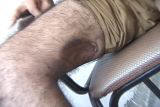 Lawyer A.J. was a member of claims committee in Al-Qaim local council before it was recently dissolved. Since October 2004
he, alone, presented more than 100 claims to the American authorities in the town. His colleagues, other lawyers, work directly
with the people, not necessarily through the council, they had more cases. Many other cases were not registered for different
reasons: no court, no police station, no security, no feeling of trust that the Americans are serious about these cases, and
a general feeling of despair and the absurdity of the whole situation. Some people however refuse to present their claims
to the enemy. Lawyer A.J. was a member of claims committee in Al-Qaim local council before it was recently dissolved. Since October 2004
he, alone, presented more than 100 claims to the American authorities in the town. His colleagues, other lawyers, work directly
with the people, not necessarily through the council, they had more cases. Many other cases were not registered for different
reasons: no court, no police station, no security, no feeling of trust that the Americans are serious about these cases, and
a general feeling of despair and the absurdity of the whole situation. Some people however refuse to present their claims
to the enemy.
Of these hundreds of cases, only three were compensated, according to lawyer A. They were trivial , like
a case of confiscated blankets on the borders or a case of confiscated construction stones…No real cases of killing,
injury, demolished houses, car or property damage were compensated.
What the American authorities are actually doing
is bluffing the people. Last year an officer, Velasios or Belasios in Division 82 was appointed by these troops as responsible
for receiving the casualties' cases. He had an office to receive the people and the lawyers. He collected hundreds of the
original documents of these cases, with photos and official reports. He used to read the case and decide which was good enough
for compensation and which was not. He gets the addresses, supposedly to reply. All of a sudden this officer disappeared,
and all the documents disappeared with him.
Another one called Captain Fetch never agreed to compensate any case. We
got copies of about 40 replies from the American authorities, all are clichés of the same wording; the only change is the
name of the complainant. The replies were in English, full of law jargon that no one can understand. All of them say "the
claim is denied" no matter what it is. There is one sentence that says the complainant has the right to appeal in Ramadi
or Baghdad, which of course is the worst part, because if the case is denied in the spot, how the appeal would work in a place
that does not know anything about it. Some lawyers, however, did go to Baghdad to appeal, they were told that there is a responsible
office in Al-Qaim for these cases and that they have to solve the cases there, because "we have nothing to do with it",
and that this office itself should present the appeal, which is illogical.
The cheating is obvious; at least they
want to make it more difficult for the people so that they stop complaining.
"In my last meeting with the American
officer" Lawyer A. says," I asked him are you serious about the compensations", he said "yes, and there are money allocated
for these cases, but the problem is that you are bringing cases of terrorists"
"I asked him about some cases, as the
case of Malik, the mentally abnormal old man who was shot, and about Abid the crippled who was shot in front of his house,
and about Abdul Qadir who was killed by a mortar grenade in his house, and his two sons who were killed in their father's
funeral inside the same house two days later"
- In such a situation, as a lawyer, what do you advise
the people?
- I advise them to raise their voices, to tell the International and the humanitarian organizations
about their violated rights. But the problem is the people are too tired and desperate of any possible change, and also the
bombing, the curfew, the difficult situation in general.
"We know that the casualties are not terrorists"
-
Why do you think the American are killing so many civilians? We asked A.
"A prisoner in one of the American prisons
asked a guard the same question, and the soldier replied: we know that they are not terrorists, because the terrorists who
hit us do not stay in the same place. But we are doing this so that the civilians would not allow the terrorists to hit us"
. The prisoner asked again" if you, the Americans with all your power and weapons are not stopping them, how do you think
we could" and the reply was" that is why we keep on shooting so that the civilians prevent the terrorists from attacking us"
So
it not mistake, not "collateral damage", but a policy of terror and intimidation.
These testimonies are just few examples.
There are hundreds more.
Sabah Ali, June 20,2005.
To be continued…
Thanks to Dirk Adriaensens,
Brussells Tribunal
:: Article nr. 12800 sent on 20-jun-2005 18:15 ECT
:: The address of this page is:
www.uruknet.info?p=12800
:: The incoming address of this article is:
www.brusselstribunal.org/ArticlesIraq.htm#AlQaim2
IRAQ: Aid agencies call for access to Karabila21 Jun 2005 07:46:10 GMT Source: IRIN BAGHDAD,
20 June (IRIN) - Aid agencies and doctors have called on Coalition forces in Iraq to allow them safe access to the village
of Karabila in the west of the country, as battles between troops and insurgents continue. "The situation is critical
in the village of Karabila. Hundreds of injured people are inside the town requiring urgent medical treatment but have been
prohibited to leave the village by US forces and we are not authorised to enter there," Dr Hamed al-Alousi, director at the
nearby al-Qaim general hospital, said. 'Operation Spear', launched on 17 June, is the second Coalition offensive in
the Anbar governorate designed to root out insurgents and prevent foreign rebels using the region as a staging post en route
from Syria. Karabila is close to the Syrian border and home to some 60,000 people. Al-Qaim, recently the scene of similar
battles, is the nearest town to the village, some 320 km west of the capital, Baghdad. According to al-Alousi, since
Friday they received 15 bodies and treated 27 injured people in al-Qaim before US forces closed entry points to Karabila.
He added that more than 100 people may have been trapped under houses destroyed during the offensive. A US military
source in Baghdad said that more than 90 insurgents had already been killed in the offensive but denied that there were civilian
casualties. "We have some medicine and emergency supplies in our hospital but as we cannot enter the village it has
become useless," al-Alousi added. Iraqi Red Crescent Society (IRCS) staff said that hundreds of residents had fled
Karabila over the weekend carrying white flags and were camped in the desert a few kilometres away. "We have reported
that more than 7,000 families from Karabila are camped in the desert near to the village. All of them need urgent food and
medical supplies and more than 150 houses have been totally destroyed inside the village," Firdous al-Abadi, a spokeswoman
for the IRCS, said. She added that thousands of families inside the village had run out of water, power and food supplies
as they could not leave their homes and aid agencies have not been able to enter. "The situation is very critical in
the area and could become a humanitarian disaster. We are going to send a convoy with supplies on Tuesday and will try and
get inside the village," a senior IRCS official said. The convoy of four trucks and two ambulances will carry food
parcels, blankets, tents and water canisters. The agency has asked for help from other aid organisations for medical supplies
in particular. Source: IRIN News
|
